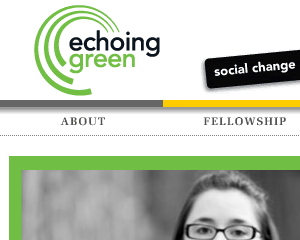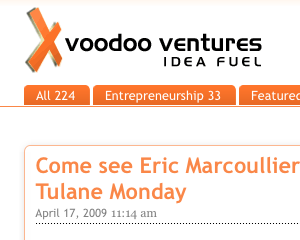The Feast New Orleans Food for Thought About the Social Innovation Movement
April 27th, 2009 by
Editor’s Note: This was written immediately after the feast in February and has been in queue for publication since (in other words, my bad).
New Orleans Contemporary Arts Center graciously hosted the Social Innovation Conference called ‘The Feast’ put on by All Day Buffet. Social change entrepreneurs joined together to talk about the social change movement that is about to explode. As the entire nation in quietly experiencing the beginning stages of a business paradigm shift, New Orleans is growing into the next hot spot for the movement. Some refer to it as the next Silicon Valley because of the incredible opportunities that New Orleans has to offer start up companies, for profit and nonprofit alike.
The conference started with a presentation from Heather McGrew of Echoing Green, a 501c3 organization that invests in “new leaders who have untested, smart ideas that deserve to be implemented”. They’re looking for great new social change agents or social entrepreneurs worldwide with new ideas. The focus of Heather’s talk was about ‘identity’ and what that means for an organization, company, and the third sector as a whole.
The cycle of identity goes like this: A start up organization realizes it needs credibility to get funding and investors, it begins to create a brand that people recognize, as the organizations grows the brand becomes more and more widely recognized (credibility) due to press releases, logos, website design, ads, completed projects, etc. The building of the brand can begin to dominate goals rather than the mission of the organization. So, the question becomes, how do we get back to the movement? How do we get back to the social change mission we started out seeking to accomplish?
The organization’s leadership must have the same vision, which must be congruent with the mission. Everyone needs to be on par with and seeking to accomplish the mission. In addition to the mission there are long-term goals that social change entrepreneurs are trying to reach. This one project will change a segment of the system in place but the entire system is the long-term goal. Many social entrepreneurs have this global ambition however; as an organization takes on an identity it becomes territorial of its resources and mission. For example, GTECH, Green Coast Enterprises, and SPOUT may all find themselves competing for some of the same grants, investors, land, etc. Competing over resources to accomplish similar missions is not what the organizations are about. Competition in the third sector, unlike the private sector is less likely to produce successful results. Ideally social change organizations would use the limited resources available to them in the most efficient manner. This means collaboration on a large scale, larger than we have seen yet in this sector; collaboration that is about identifying with the movement not the organization’s brand.
Rachel Botsman and Tamara Giltsoff from Social Innovation Sustainability Space presented a similar message regarding a business paradigm shift and the theme of ‘connectedness’. I thought the most illustrative example of the change that we hope to see more of in the business world is the collaboration between Coca Cola and the World Wildlife Fund (WWF). Coca Cola has the most water efficient manufacturing plants however the WWF was saying, it really doesn’t matter how efficient your water usage is if there isn’t any water left to use. Coca Cola and the WWF spent years spending money lobbying for their positions. Then Coca Cola understood and formed a partnership working to conserve the water we have now. This is an example of private and public sector organizations identifying themselves with the social change mission not their brands. The overall message being that everything is interconnected and people and organizations need to shift a large part of their identity and the reason they do business toward social change.
Speaking of interconnectedness, NOLA faces a hard battle improving its broken education system. John Alford spoke about NOLA 180‘s plans for implementing a school turn-around plan through out individual schools in New Orleans. Currently, the model is being tested on Langston Hughes Academy where students are held high standards and personal accountability. The students serve a 9-hr school day, have homework, and are taught strong moral principals in addition to academic lessons. Langston Hughes will likely serve as an incubation school for new teachers and administrators to be trained for the eventual take over of another school that seeks to be turned around. John’s models are impressive and daunting, there is a lot going on in them, which means an equal amount of work to do. But, they’re visible, the plan is accessible and all we need to do is execute. As he said, the New Orleans we are building now with young, successful talent cannot be sustained if the future generation of New Orleans is not being educated. The students are connected to New Orleans success.
Chris Schultz’, Voodoo Ventures, a local business and social entrepreneur gave an incredibly motivating and inspirational speech about start up organizations. He taught all of us how to execute ‘bootstrapping’ perfectly. That is pulling yourself up by your bootstraps and putting your ideas out there and in motion. Fear of failure should never enter your mind; everyone fails at least once and if you fail you pull yourself up by your bootstraps and move on to the next idea. Also, entrepreneurs often have the ‘impostor syndrome’ that is the fear of being considered an impostor. This, he says, needs to be shoved off as quickly as possible. Of course someone has thought of your idea before, but have they executed it?

Receivables Exchange Web Site
Nicolas Perkin honed in on this point in his presentation about his company The Receivables Exchange. He told the story of how his current investor had almost invested in someone with the same idea a couple years before but, the Receivables Exchange plan had the kinks worked out and the other didn’t. The investor invested in their company and the company has been and still is incredibly successful. Lesson: It’s all about execution. The idea isn’t what makes the company its how it’s executed. What we all need to remember is, as Chris said, ‘the one renewable resource we can all count on is our ideas’. We’ll always have new ideas and some of them are less than stellar but others are treasures. Now we need to ‘just do it’.
Jay Parkinson founder of Hello Health was the case in point changemaker. Dr. Parkinson is a doctor that has become fed up with the current way America practices medicine. He brought it to our attention that we’re really stuck in the 1970′ in the way America delivers healthcare. You make an appointment, go to the office, fill out a bunch of paperwork, see the doctor for eight minutes, he writes down what happens, tells you a number of things, you leave, forget 85% of what he told you, and then you have no further communication. Then the paper chart is filed away so you have no reference to that either. Insurance companies and other payment options add to the frustration of doctors and patients. In the most simplified way possible to explain the problem, there is no incentive for a doctor to care for their patients as well as possible. And, quite with the current system there is no way for a doctor to do so.
Dr. Parkinson took the social networking tools we use in this century and created a website that allowed patients in his area to look at his goggle calendar, make an appointment and he would make a house call. Billing would be done through PayPal and there was no need for staff, office, and the practice of paper documentation is now documented on your personal medical profile, available online. Now, the doctor is being paid upfront, quality care is provided to the patient, there is no hassle with waiting rooms, and you can communicate with you doctor and access your medical records with ease, at any time. It is revolutionary and is exactly the type of paradigm change that causes systemic change.
Woody Tasch, author of Slow Money, introduced social changemakers that have accomplished systemic changes in their communities though years of persistence. An interesting example was organic farming and various other resource-accountable organizations that are working to sustain resources. The point that I took away from his presentation is that everyone needs to be aware of what impact everything we do has on our resources. Putting this knowledge in numbers that we can actually imagine and visualize is key. Let’s not talk in billions anymore, let’s break it down and talk in the amount we can all comprehend.
The type of ideas that Dr Parkinson and other social change agents have are what organizations like Ashoka, All Day Buffet, and Echoing Green invest in. Ashoka, based out of Washington DC, encourages and invests in social entrepreneurs. They offer them invaluable resources and a network that will allow them to stay sustainable.
New Orleans is a fertile ground for startups, nonprofit and profit alike, the plea I heard today is: as NOLA starts to take off, let’s keep our mission’s identity in mind. Let’s create a mission that changes the world because our entire city is working together to create social change. Let’s set the example of how social change innovation should be done for the rest of the world. Let’s create the social change industry that revolutionizes the way businesses, government, and public organizations operate.






